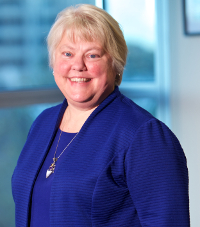
I have enjoyed visiting member schools this year and learning about the exciting innovations happening throughout legal education on so many fronts. I am confident that the quality of legal education within AALS member schools has never been higher. Throughout our membership, faculty and staff are working hard to deliver more to our students while also trying to hold down costs. One of the most promising developments I am seeing in this spirit is a number of creative collaborations between and among our schools.
These collaborations hold considerable promise: not only do they communicate to our students and communities an alternative model to what is often seen as a highly competitive ethos in legal education, these collaborations also help to control costs while supporting innovation. While the below examples are by no means exhaustive, they do provide an introduction to the range of collaborations taking place. My hope in shining the spotlight on this aspect of legal education is to congratulate these schools and to encourage more of us to give this a try.
Some examples include:
Wisconsin and Marquette partner to provide the Annual Wisconsin Pre-Law Diversity Day, which concludes with a law fair featuring more than 40 law schools. Along the way, prospective students participate in a mock trial class and learn about the application process, life as a law student and lawyer, and the importance of diversity in the classroom.
Arizona’s three law schools (Arizona, Arizona State, and Arizona Summit) together created an option for 3L students to take the bar exam in February, an option that has proved especially helpful to graduates with children.
Several schools are part of regional scholarship exchanges, such as the one in New York among Albany, Pace, NYLS, Touro, Temple, and Suffolk; there is also the Rocky Mountain Junior Scholars Conference that BYU and Utah jointly convene.
As schools have sought ways to help students launch solo or small firm careers, incubator projects have grown. In Los Angeles, the LA Incubator Consortium is a collaboration among Loyola, Pepperdine, Southwestern, and UCLA. In Boston, BU, BC, and Northeastern have launched a joint incubator program called Lawyers for Affordable Justice.
Other schools work together on justice projects such as the Innocence Project, the effective collaboration between Cincinnati and Case Western on wrongful convictions matters in Ohio. St. Mary’s has launched a collaborative Peer Court pro bono program in which students hear non-felony infractions by high school students who would otherwise be in truancy and juvenile courts. Law students from every law school in Washington, D.C. (and a few nearby) participated in a Community Listening Project organized by UDC’s Professor Faith Mullen to act as focus group facilitators or administer nearly 600 in-person legal needs surveys.
Some schools collaborate on programs in shared subject areas of emphasis, such as joint trainings and online courses that Maine and George Washington conduct in the area of government contracts and procurement. Another such example is my own school’s work with Santa Clara on access to justice and technology. Southern Illinois and John Marshall similarly work together in the area of Veterans Legal Assistance.
More broadly, there is also the Consortium for Innovative Legal Education with California Western, Mitchell-Hamline, South Texas College of Law Houston, and New England Law/Boston. In Chicago, Loyola, DePaul and Chicago-Kent College of Law have joined to permit students to take electives at each of the other schools.
A large scale collaboration among more than 200 libraries (nearly all of them representing law schools around the world) was developed by Harvard’s Library Innovation Lab. In two short years, they have come together to create Perma.cc, the distributed service allowing long term preservation of the online materials to which scholars and judges link in their papers and judicial opinions. Before this new project, more than half of the links in U.S. Supreme Court opinions and huge numbers of other links no longer worked.
Finally, I’d be remiss in not mentioning my own state, where the three Washington schools (Gonzaga, Seattle, and Washington) sponsor a joint “modest means” program with the state bar that provides our students an outstanding experiential opportunity while also helping Washington’s underserved populations with foreclosure proceedings. And because we are both in Seattle, UW and Seattle have taken our collaborations an additional step to jointly launch a new law clinic (workers’ rights) and to share two others.
While law schools, especially through clinics and pro bono programs, have long had many innovative and effective collaborations with the bar and legal services organizations, it is promising to see so many joint projects taking root between and among our schools. These shared programs can help us model effective team work and collaboration for our students while also broadening their opportunities. These collaborations can also help us to make the most of our precious resources as we all strive to fulfill our missions and advance law in the communities we serve.
In closing, let me remind you that AALS wants to know about your exciting programs and innovations and to help you spread the news of your school’s success. If you have a great example of other collaborative projects, or other news to share, please send it to us at [email protected] for inclusion on our website. We are here for you. See you all at the Annual Meeting in the great city of San Francisco, if not before!